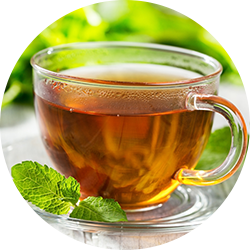Discover the Benefits of Raw Honey
Do you have a sweet tooth? If so, you’re like many people worldwide who crave the vast assortment of deliciously sweet foods that tempt us on a daily basis. There’s nothing wrong with having a sweet tooth, but it requires that we indulge in moderation and choose healthier, more natural sources of the sweetness we crave.
For many of us, that means reaching for raw honey. But what’s the difference between raw honey and regular honey? And what are the benefits of raw honey vs. sugar? We’ll answer those questions and more below.

Refined Sugar and Your Health
While having an attraction for sweet flavors, and thus sugars, served as an survival benefit over the centuries, it’s become a huge disadvantage to the population in more recent decades. As sugar processing became more advanced, and sugar became a cheap commodity, it seemed that sugar was added to almost every processed food in one way or another.
With the rise of health concerns over this trend, it's become clearer that high sugar consumption can be linked to a variety of health issues, from poor weight management and metabolic health, to heart health concerns and even decreased immune system function.1
Therefore, anyone seeking to be more health-conscious in their dietary choices should consider seeking alternative options when it comes to the consumption of refined sugar. One option is to minimize or eliminate processed sugars altogether. Another option would be to make sure any isolated sugars consumed come from more natural, and nutritious, sweeteners.
This is where raw honey takes center stage.
What Is Raw Honey?
Raw honey has been used by humans for at least 10,000 years, playing vital roles in health, healing, religious and cultural traditions. Raw honey is essentially the same as the honey found in a beehive, except it’s been treated in a filtration process that includes straining the honey through a mesh or nylon cloth to eliminate impurities like beeswax or insect parts.2
Aside from this filtration, raw honey is honey in its pure, unheated, unpasteurized and unprocessed form. This is perhaps one of the most important characteristics and health benefits of the final product, as it preserves all the natural vitamins, essential minerals, enzymes, phytonutrients and other nutritional elements.3
For these reasons, true raw honey is quite different from processed, commercial honey.
Characteristics of Raw Honey
Raw honey can be purchased as a liquid or paste. If you purchase raw honey that's in liquid form, it may crystallize or solidify over time. Raw honey can be clear, opaque or milky in appearance. Its color can vary from white to various shades of yellow, and even brown.
All of these characteristics will depend on the type of flower that the bees retrieved the nectar from for the honey. It's not possible to tell whether honey is raw or pasteurized based on color, taste or form (liquid or paste) alone. While some honey experts believe that they can detect pure, raw honey by taste alone, this won't be the case for most of us.
How to Ensure You’re Buying Raw Honey
To ensure the honey you’re buying is raw, make sure to check the label. While there's currently no widespread, uniform regulation or certification for raw honey, words like "untreated" or "unpasteurized" can be helpful indicators, if not a 100% guarantee of a truly raw product.
While it goes without saying that any honey labeled as “pasteurized” isn't raw, keep in mind that terms like “natural” or “pure” hold little significance as to whether or not you’re buying raw honey. For example, some beekeepers may not necessarily pasteurize their honey, but they may still heat it to some degree.
If your honey label doesn't specifically say that it's raw and only labels it as as untreated or unpasteurized, it may not be raw. Contact the maker directly to be sure, or find a local farm or beekeeper you can trust, so you’ll know exactly where the honey comes from and how it’s prepared.
Swanson makes the hunt for organic, raw honey quick and easy by offering its own raw honey that's certified organic and sourced from the Upper Midwest region of the United States.
Why Organic Honey is Better
It's always best to source out raw, organic honey, and the only guarantee you’re getting a truly organic product is to look for the USDA Organic certification badge on the label. Beekeepers have to meet stringent production standards and conditions to be certified organic.
Raw, organic honey cannot contain any pesticide residues or environmental pollutants. Organic hives also cannot use non-organic honey, sugar, or any antibiotics or pesticides for their bees. Depending on your source, it's normal for raw honey to contain particles of bee pollen, honeycomb bits and propolis. These inclusions contribute to the popularity of raw honey because they can be beneficial to overall health.4
Natural Health Benefits of Raw Honey
First and foremost, being a sugar, raw honey offers a quick source of energy. It’s also a prebiotic food that helps the good bacteria in your gut thrive, provides many antioxidants and supports overall immune health. The main health benefits for which we revere raw honey come from the unique blend of vitamins, minerals, enzymes, antioxidants, phytonutrients and other healthy components it possesses.
The two key beneficial components of raw honey are bee pollen and propolis.
Bee Pollen in Raw Honey
Bee pollen is a super nutritious compound, containing an impressive number of the nutrients required by the human body. It's a source of proteins, vitamins, minerals, beneficial fatty acids, carotenoids and bioflavonoids, which are helpful to cardiovascular health.5
In fact, bee pollen contains more than 250 active components, including a wide variety of antioxidants. Bee pollen is so incredibly healthy that some people take a bee pollen supplement to gain even more of its health-boosting benefits!
Propolis in Raw Honey
Propolis is a resin-like mixture produced by bees to maintain and protect the hive. Bees make propolis with organic compounds they collect and it’s extremely rich in phenolic compounds, including 12 different flavonoids, plus many vitamins and minerals.
The list of reported health benefits from bee propolis is as long and varied as the nutrients within it! Some benefits of raw honey with propolis include supporting immune system health, glucose response, healthy cholesterol levels already within the normal range and more.6
Raw honey doesn't ferment in the stomach and can actually be used in supporting digestive system health. Unlike most sugars, raw honey is not known to aggravate a sensitive digestive tract.6 Additionally, raw honey is alkaline forming, as opposed to acid forming, which means that it helps your body maintain a neutral alkaline balance. This is important because if alkalinity is not obtained through diet, the body will leech calcium, which is an alkalizing mineral, from your bone structure.7
Natural honey, by contrast, is acid forming. For best natural health, our daily food supply should be higher in alkaline-forming foods, rather than acid-forming foods.
Things to Keep in Mind Regarding Raw Honey
While raw honey does have a place in a balanced diet, keeping everything in moderation is always a good practice, and raw honey consumption is, to be fair, something to avoid over-indulging in.
With that in mind, there are a few raw honey concerns that every health- and planet-conscious individual should be aware of:
- Extra Calories: Honey is a fast way to add calories to a meal. A tablespoon can yield about 58 calories and 15 g of carbohydrates.8 Thus, if you're interested in losing weight, or not gaining excess pounds, you have to be careful about how much, and how often, you use honey. Fortunately, due to honey’s intensely sweet flavor, it's hard to consume a lot of it at once.
- High Sugar Content: Honey is about 40% fructose and 30% glucose, with the remaining carbohydrates including maltose, sucrose and other complex carbohydrates.9 Even though raw honey has been studied for aiding insulin regulation, regular or high consumption of any sugar can cause various imbalances.
- Bacterial Contamination: Because honey is very low in water content and very high in sugar content, this makes it undesirable for microbial growth. However, in rare cases, endospores of Clostridium botulinum (the bacteria that can cause botulism) have been found.10 This usually isn’t a problem for an adult digestive system, but it’s why honey should not be given to infants.
- Bee Welfare: Fortunately, we live in times where concern over the welfare of other living creatures has become important to many people. Hence, buying honey from local beekeepers whom you know, or companies who practice humane treatment, is vital when purchasing raw honey.
Is it Safe to Eat Raw Honey?
In the end, raw honey can be beneficial to our health and environment if consumed in moderation and properly harvested by mindful beekeepers. It all depends on its source and how it's used. Raw honey can be a healthier and potentially beneficial replacement for refined sugar in your diet, but it’s essential to search for the right variety to enjoy the maximum organic benefits. And, don’t forget that related beneficial compounds like bee pollen and propolis are available as nature-sourced health supplements as well!

About Lindsey Toth, MS, RD
Lindsey is a nationally recognized registered dietitian and nutritionist with a soft spot for pie. She empowers people to take charge of their health by finding the balance between the pleasure and nourishment in food. Her philosophy is that you should take care of your body because it’s the only permanent home you have. It’s what inspired her to pursue a career in nutrition.
*These statements have not been evaluated by the Food and Drug Administration. These products are not intended to diagnose, treat, cure, or prevent any disease.
Sources
1. Sugar Consumption. National Library of Medicine. Read source
2. Processing of Honey. International Journal of Food Properties. Read source
3. Phenolic Compounds in Honey. Molecules. Read source
4. Biological Properties and Therapeutic Applications of Propolis. PubMed. Read source
5. Protective Effect of Bee Pollen. National Library of Medicine. Read source
6. Honey, Propolis, and Royal Jelly. Oxidative Medicine and Cellular Longevity. Read source
7. Benefits of Alkaline-Forming Nutrition. U.S. News & World Report. Read source
8. Health Benefits of Honey. EUFIC. Read source
9. Honey and Diabetes. Oxidative Medicine and Cellular Longevity. Read source
10. Isolation of Clostridium botulinum from Honey. California Department of Health Services. Read source


